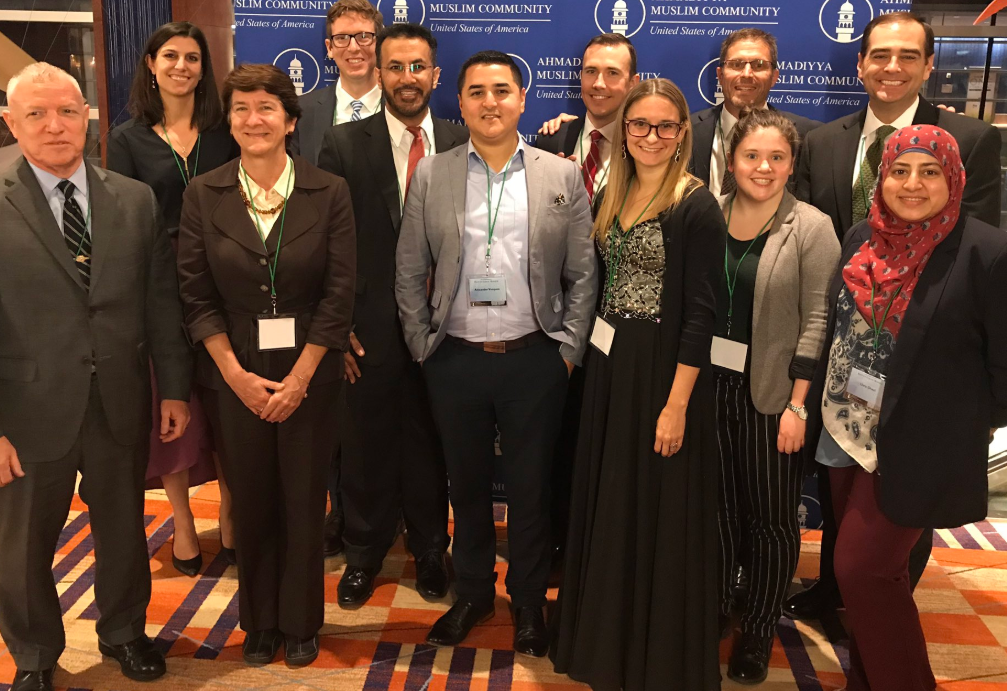An Evening of Fellowship: Veterans Welcome the Leader of the Ahmadiyya Muslim Community

By Teresa Kennedy
On October 20th I was honored to join several fellow members of Veterans for American Ideals in attending a dinner in Baltimore hosted by the Ahmadiyya Muslim Community. We were invited to be part of a special moment as they welcomed their international leader, His Holiness Mirza Masroor Ahmad.
I would characterize my understanding of Muslim culture as “Novice—Level 2.” My partner of several years speaks Arabic and is building her career in international development in the Middle East, so she has lived in that region multiple times during her life. In our many debates about current events, she has challenged my Eurocentric misconceptions about Islam. Despite my pursuits to enrich my intellectual understanding of the Arab world, books and conversations pale in comparison to experiencing a culture first-hand, which is what brought me to the dinner in Baltimore.
Much to my surprise, most of the four hundred guests at the honorary dinner were not Muslim. Instead, the ballroom was filled with a diverse mix of people who had been invited for a delicious meal and to hear the Ahmadiyya community’s most important leader speak.
His Holiness addressed the rampant fear directed towards Muslims around the world, but emphasized the teachings of the Qur’an which are so dichotomous with the declarations of extremists. He declared Islam a religion of peace and that in this era of factions it is important for all peoples to come together in unity to face international challenges together. At the end, he specifically thanked all the non-Muslims in the audience for attending the dinner, for seeking to know more about the religion, and for standing with the community as they dedicated a new mosque in Baltimore.
The entire night I was blown away by how warm the Ahmadiyya community was in welcoming us. The members were patient and forthcoming in answering questions about the evening which seemed specifically designed to welcome in non-Muslims to a deeper understanding of the culture. I was struck by the effort and warmth that the community put into the evening. I was compelled to reflect on how I sometimes decline to share my knowledge of military culture with civilians without any military experience.
With an estimated less than one percent of the U.S. population having ever served in the military, those who have—even in a limited capacity such as myself—can find themselves isolated in a society which is limited in its understanding of military culture. My reluctance to share my experiences is not from lack of wanting to bridge the civil-military divide, but rather it comes from a tutor-fatigue; a mixture of exhaustion and frustration at having to be responsible for filling a gap that society is not, and from a bitter taste of attempts met with acrimony.
I imagine that I am not alone in the irritation I feel with a society which over-glorifies military experience without fully understanding it. This lack of understanding not only extends to the experience of combat, of which I cannot personally claim, but to the day-to-day realities, the mindset, and the motivations of military service which can be so different from the civilian world. All this ran through my mind as I listened to His Holiness speak about how grateful he was that so many people came to share in the celebration. It humbled me that a man of his stature would take time to speak with and meet those outside of Baltimore’s Ahmadiyya community. I was inspired by this community to recommit myself as an ambassador of my own life experiences—military, female, queer—and motivated to be as warm and hospitable in answering ignorance with patience and fellowship.
Teresa Kennedy is a 2016 graduate of the U.S. Naval Academy and a 2015 Harry S. Truman Scholar. She currently lives and works in Washington DC as a defense consultant.

